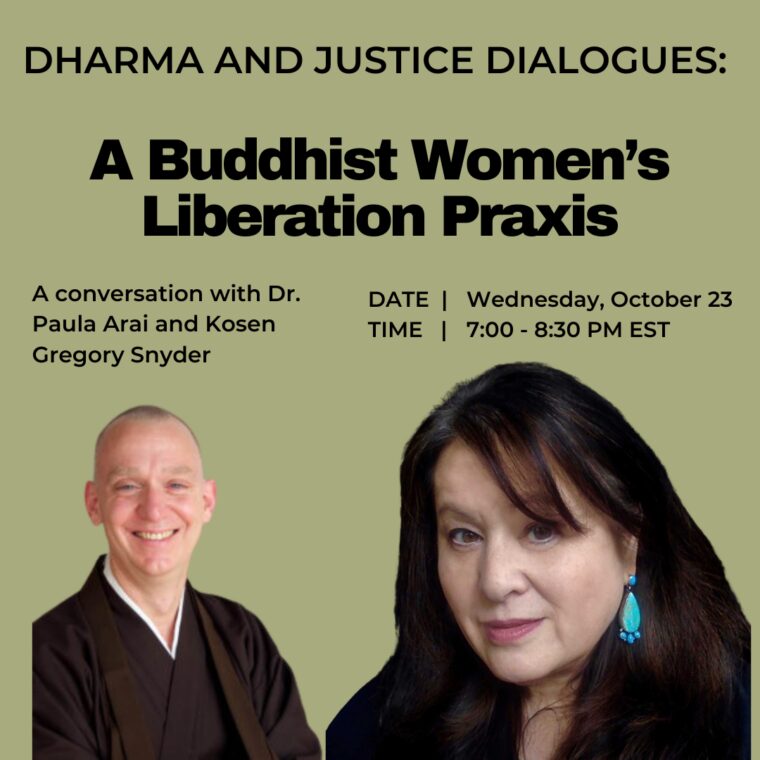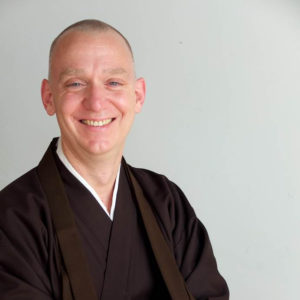
Dharma and Justice: A Buddhist Women’s Liberation Praxis
In order to expand the purview of Buddhist Studies and support women’s practice, Dr. Paula Arai has developed nine principles to illuminate how women, or anyone, can wield liberating power. These principles suggest ways to apply the Buddhist teachings on the cessation of suffering and practice of compassion to interpret the Buddhist tradition. They promote identifying and analyzing the dynamics of a situation, as well as prompt potential liberating strategies. These women-centered hermeneutic principles form the core of a Buddhist Women’s Liberation Praxis. Join us for this lecture and conversation.
 Paula Arai (Ph.D. in Buddhist Studies, Harvard University) holds the Eshinni & Kakushinni Chair of Women and Buddhist Studies at the Institute of Buddhist Studies. She is author of Women Living Zen, Bringing Zen Home, Painting Enlightenment: Healing Visions of the Heart Sutra, and The Little Book of Zen Healing: Japanese Rituals for Beauty, Harmony, and Love. She also co-edited The Oxford Handbook of Buddhist Practice.
Paula Arai (Ph.D. in Buddhist Studies, Harvard University) holds the Eshinni & Kakushinni Chair of Women and Buddhist Studies at the Institute of Buddhist Studies. She is author of Women Living Zen, Bringing Zen Home, Painting Enlightenment: Healing Visions of the Heart Sutra, and The Little Book of Zen Healing: Japanese Rituals for Beauty, Harmony, and Love. She also co-edited The Oxford Handbook of Buddhist Practice.
Her current project is: Of Lotuses and Mud: Women Liberating Dharma. Steeped in ethnographic research, she takes an embodied approach to her work and finds poetic immersive storytelling a potent medium for conveying the experiences of transformative healing she researches. An active public speaker, Arai also leads workshops on healing rituals. Website: Zenhealing.org
 Rev. Kosen Greg Snyder, Osho is the Senior Director and Assistant Professor of Buddhist Studies at Union Theological Seminary, where he oversees the Master of Divinity degree program in Buddhism and Interreligious Engagement as well as the Thích Nhất Hạnh Program for Engaged Buddhism.
Rev. Kosen Greg Snyder, Osho is the Senior Director and Assistant Professor of Buddhist Studies at Union Theological Seminary, where he oversees the Master of Divinity degree program in Buddhism and Interreligious Engagement as well as the Thích Nhất Hạnh Program for Engaged Buddhism.
Professor Snyder is an ordained Zen Buddhist priest and dharma-transmitted teacher in the lineage of Shunryu Suzuki. He co-founded and is currently the senior resident priest at the Brooklyn Zen Center and Ancestral Heart Zen Monastery in Millerton, NY. He is one of the founders of the Buddhist Action Coalition, whose mission is to organize and inspire compassionate Buddhist initiatives in advancing social, economic, and environmental justice through advocacy and nonviolent direct action.
Professor Snyder’s academic and practice interests include socially engaged Buddhism, the intersections of contemplative interreligious dialogue and social action, the relationship between Buddhist liberatory practices and social transformation, and the exploratory juxtaposition of Buddhism with liberation theology, Earth-centered cosmologies, and Western continental theory, particularly phenomenology and post-structuralism. Professor Snyder is currently working on a book exploring expressions of social justice rooted in Buddhist dharma, moral epistemology, and praxis. He has been published in Buddhist and other periodicals, including Buddhadharma, Lion’s Roar, Shambhala Sun and the New York Times.
